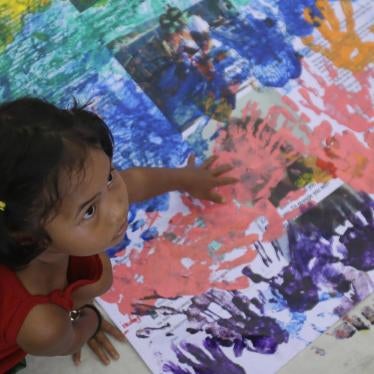Come Monday, most of Indonesia's 150 million registered voters will be able to cast (or not cast) their ballots in a relatively peaceful environment. Indonesians should be proud that they have reached yet another major political and logistical milestone on their road to full democracy.
But it is a shame that Indonesians living in Aceh (Nanggroe Aceh Darussalam) will not be able to share in the joy and pride of freely participating in a legitimate election. The ongoing armed conflict in the province was downgraded in May from a military to a civilian emergency, but little has changed on the ground.
Fighting continues and restrictions on access remain in place. The majority of the population continues to live in fear, with widespread reports of killings, torture and disappearances. Local, national, and international media remains severely restricted in their ability to report impartially, or critically, on either the conflict or the election in Aceh.
Ensuring that the people of Aceh can vote as they choose on Monday would be a significant step in getting away from the province's seemingly intractable conflict. Establishing a pattern of respect for peaceful and democratic decisionmaking is the only way likely to end the bloodshed in Aceh.
Because, although largely forgotten in the political rhetoric by all presidential candidates, the conflict in Aceh, and how to end it, will be one of the most pressing and difficult tasks the newly elected president will have to tackle.
Security has improved in Aceh's main towns, but conditions in the outlying districts are far from stable. Press reports indicate a high, almost daily, level of fighting with fatalities recorded every week. Refugees continue to flee to Malaysia with stories of extrajudicial executions, serious abuse, arbitrary detention, and restrictions on movement.
On top of all this, there are troubling indications that Aceh's voters have faced improper pressure from both the Indonesian military and GAM. In 1999 the majority of Aceh's voting population registered their discontent with Jakarta by boycotting the national election.
In April this year newspapers reported that the turnout at the polls in Aceh was a staggering 95 percent -- a figure high for even the most peaceful and prosperous of Indonesia's provinces. The Indonesian Military (TNI) claimed this as a vindication of its hearts and minds campaign. But it is equally (if not more) likely that this high voting rate demonstrates at least in part the military's ability to intimidate the population into voting.
Meanwhile, it seems clear that the Free Aceh Movement (GAM) has been doing its best to force the local population to boycott the elections. Civilians were trapped either way.
Both the Indonesian government and GAM should make a public commitment to declaring and enforcing a cease-fire for at least the day of the election. Voters should be allowed to make their own choice as to whether or not to participate in the election, and be able to do so in a secure and peaceful environment.
Creating an environment conducive to an election is one marker for a free and fair vote. Another is the presence of independent observers. Unfortunately, access to Aceh for election observers remains severely restricted.
During Indonesia's April legislative elections in Aceh, election observers from the European Union were only allowed into the province at the last minute, were unable to observe either the opening or closing of polling stations, and were unable to travel much outside the main towns without military escorts.
Under these circumstances no assessment was possible of the security of ballot papers, or ballot boxes, either before or after the vote. EU observers were also ushered out of Aceh sooner than their counterparts in other provinces. Some embassies who sent representatives to Aceh for the election encountered similar problems.
Long and short term access to Aceh both before and after the July election will be essential to assess the validity and climate of the vote in the province.
In particular, if the presidential election indeed goes to a second round stand off between two candidates in September, the potential for political violence, intimidation and mobilization will increase. In case of a runoff, it is crucial to place long term observers throughout Aceh during the intermediate July to September period.
The media, another essential check on mischief by the government and GAM, has suffered the same restrictions on access as other independent monitors in Aceh. Journalists have been regularly intimidated and threatened, by both Indonesian security forces and GAM, over critical coverage of the conflict since the war began in May 2003.
Restrictions, intimidation and threats against all media should cease immediately. A free and independent press is a key indicator for the success or otherwise of an election. Failure to do so will throw the credibility of the vote into question.
A valid election in Aceh will be an important test for democracy in Indonesia. National elections can not exclude specific provinces. A failure to hold free and fair elections in Aceh will be a failure to provide Indonesian citizens with their basic right to political participation.
Sam Zarifi is Deputy Director for Asia, Human Rights Watch.






